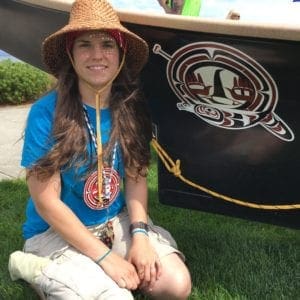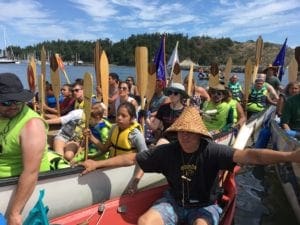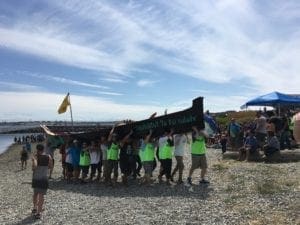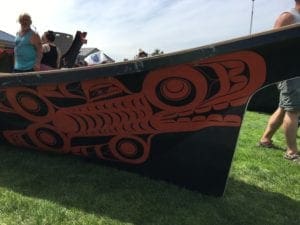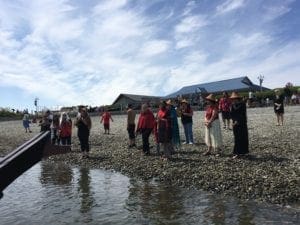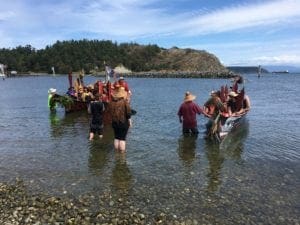Canoe Journey 2019 – Samish Landing
July 26, 2019 - 3:02 pm
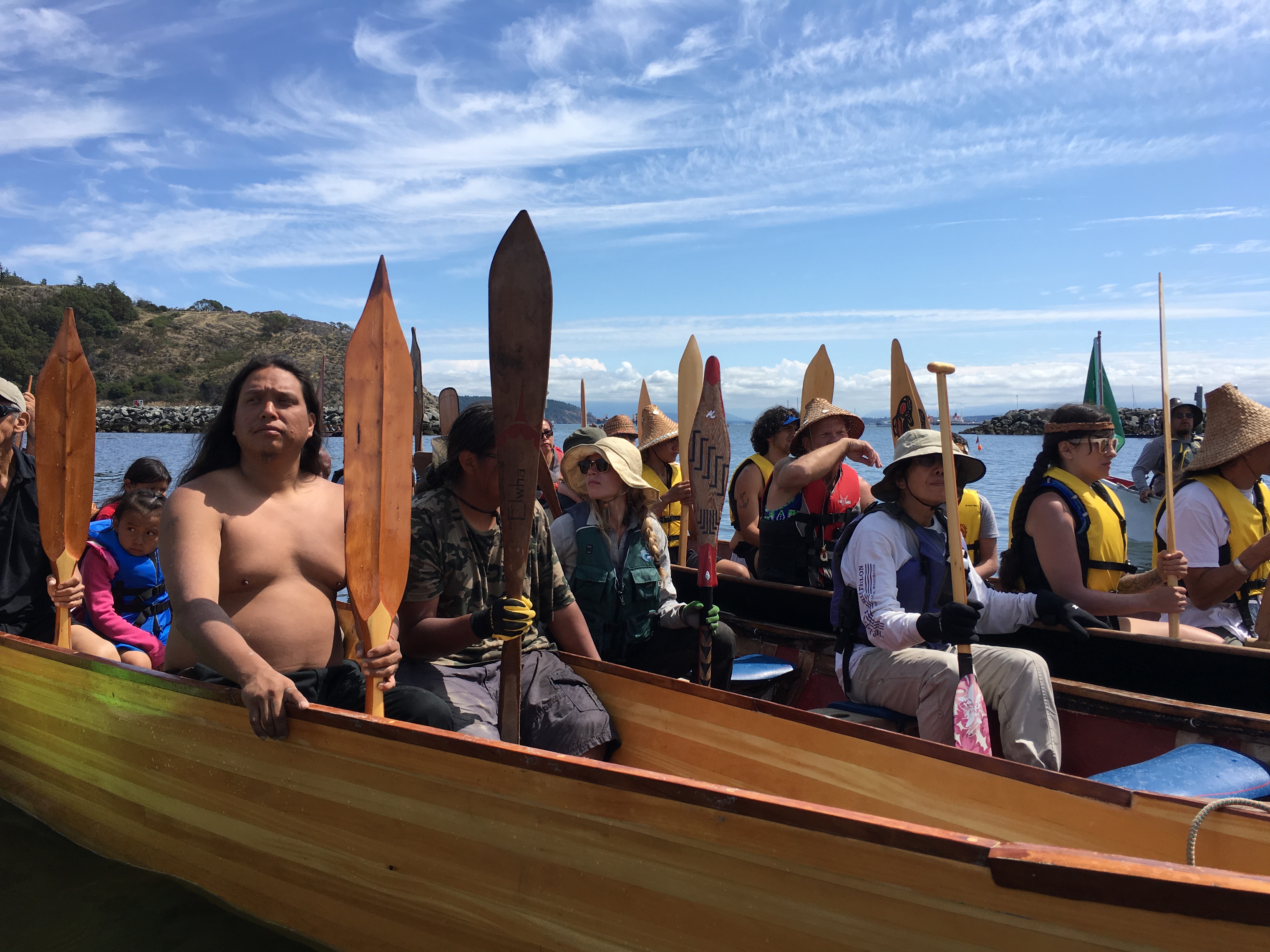
This year’s Tribal Canoe Journey, honoring ancient indigenous traditions is underway. The Lummi Nation is hosting this year’s festivities by welcoming over one hundred indigenous canoes to their shores. Canoe families come from Washington state, British Columbia, Alaska and as far as Hawaii. KBCS’s Yuko Kodama was at the Samish Landing, a day before protocol started in Lummi. She brings you sounds and voices from the event.
Producer: Yuko Kodama and Mari McMenamin
Photos: Yuko Kodama
Thanks to John Woodgate and Jingjing Bu for help with transcription. Special thanks to Maizy Brown for assistance with this story.
Samish Landing
0:00
You’re listening to 91.3 KBCS. The annual 2019 inter-tribal Canoe journey came to a close this past weekend. KBCS Yuko Kodama was at the Samish landing last week, where over sixty canoes stopped on their way to festivities at Lummi. You will listen to sounds and stories from the event next
0:23
(Chanting)
1:03
Good afternoon. We are the Pacheedaht First Nations, our name means People of the Sea Foam. This Canoe is “Sea Foam Dancer” It’s our first pull in over 20 years. We’re revitalizing our ways and culture. We also have our Chief, Victor, and would like to ask permission to come ashore, share song and dance and participate in this afternoon’s festivities.
1:41
We’re so honored to not only have you come to our territory, but to choose to do this journey for the first time in 20 years. We’re so excited to have you here to share songs, dances and food. We also have showers, please come ashore, we’ll spend the day and the afternoon together.
2:07
My name is Elaine Grinnell I’m from Jamestown Klallam, this is Sarah. And that’s her daughter, Arya.
2:18
Three generations?
2:19
Three generations. There is a canoe going by, it’s a beautiful, beautiful representative of the culture that’s returning to all of us. And we’re so proud of that, not only the culture, but the language is also coming back. We want that so badly, its growing our tribe. It was taken away from us, you know, we couldn’t speak it for so long – My mother’s generation, it was stopped there. And you know, I can hear it. But they wouldn’t teach because we’d be punished at school and but now it isn’t, so they teach it in the schools. We have our own teacher within our tribe now. We’re writing it, it we’re taping it, We’re putting it on desks, we’re doing it every way that we can.
3:06
You want to add anything because this is three generations here.
3:09
Yeah, it truly has been a blessing to be able to follow my grandmother’s teachings for years and years.
3:16
What does she (her daughter) take away from it?
3:18
She’s two, at home we’ll sing and she’ll just start singing our welcome song, its just so fun.
3:23
She’s teaching her, Yeah. You know what that does for grandma’s heart and spirit? I’m just so proud of my family.
3:31
(Singing)
3:51
My name is Raymond, I’m from the Yakima Nation. I’m also Skokomish, Cree and Chilliwack. I’ve been doing the canoe journeys fully immersed, three years ago, when we traveled to Campbell River. I grew up traveling, we would do vending at powows, my aunt would make stuff, and we’d go to sell it. And then I ended up becoming a dancer at powows and I ended up going on the powow trail all over the United States and Canada for months on end, going to powows during the weekend and the week day, setting up my tent and taking it down and all that so I’ve been traveling for a really long time. Yeah.
4:26
Are Powows then, in a sense a little bit like the canoe journey because you’re traveling from location to location and there’s also like a hosting?
4:35
The songs and dances are different. And of course, the mode of transportation is different. We don’t travel in cars all over the United States, we’re traveling on a actual ancient highway of the Salish Sea and canoes, we usually stop at every landing area that’s scheduled. And we have to go through the certain protocols of asking permission to come ashore, you have to know the language a little bit, it’s total immersion.
4:58
tell me have a remarkable event that happened on your canoe journeys.
5:04
One thing that comes to my mind was when we were in Puyallup last year, how they were talking about the medicine. You can have a pack of cigarettes, right? The pack of cigarettes is just tobacco to anybody else, until you take a cigarette out, you open it up, and you have that tobacco in your hand. And you talk to the tobacco and ask it for it to be the medicine and acknowledge it for what it is and speak to it. And then it becomes medicine. Any other time ever anybody else, It may not be medicine, but when you put that energy into that tobacco in that manner, it becomes medicine. That’s one of the things that really spoke to me, because then I started doing things differently after that. They say that we all come from Mother Earth, and we really can’t share gifts with each other, because all the gifts come from Mother Earth too. So it’s not even about the gifts that we’re giving you know, it’s about the energy that we’re putting into it. I work for the Stillaguamish tribe, we loaded up on gifts that we bought, and we made and we’re going to share them with everybody. But the people that were traveling down here with that are from the Stillaguamish tribe are all just like amazing people that know that, you know, and they just want to gift to what they can. But it’s not about the gifts that they’re giving. It’s about the energy they’re putting into the gift that they are giving. And so it’s really, really awesome like to know that everybody’s doing that
6:27
Anything that you think it’s like the less told the story that you would want people to know about?
6:34
I think the less told story is all the ancestors that held on to this knowledge and passed it down, Even through great pains that were brought upon to kill a culture it was actually illegal for people to travel in canoes in this waterway. It was illegal for Native Americans to sing songs the way they were and me being where I’m from, I go to sweat houses, it was illegal for us to sweat. It was very important that our native ancestors held on to that knowledge and they thought it was very important that they held on to the knowledge and passed it down out of all the knowledge that actually has been lost. And there is actually 10,000 years of canoe-going people that live in the Salish Sea. And that 10,000 year was cut. There’s a lot of knowledge that’s been lost. There’s natives that can look into the water and know exactly how the sea floor is. And now there’s not hardly any out there that can do that anymore.
7:31
(Singing)
8:02
My name is Thomas Murphy and I’m the chair of the anthropology department at Edmonds Community College, where I teach and lead an environmental anthropology field school, nicknamed the leaf school for the learn and serve environmental anthropology field school. I’ve been a member of the Blue Heron canoe family and the Samish canoe family. And I’ve also traveled with this Stillaguamish canoe family. My heritage is English, French, Scandinavian and Mohawk on my mother’s side, Irish and Mexican on my father’s side.
8:34
Tell me what you teach. It sounds like it’s not your typical anthropology class.
8:40
Well, when I was a graduate student at the University of Washington, as well as an undergraduate at the University of Iowa, my field experiences as a student were the most impactful and most meaningful. And so when I had the opportunity at Edmonds Community College to develop curriculum, I was looking towards developing a field school option. Particularly in anthropology, there’s a tension between the anthropologist coming in studying somebody else’s community, And you know, just taking information from that community for the benefit of academia or that that individual anthropologist and not necessarily providing something in return to the community that is sharing that information and knowledge and so I was motivated by decolonizing methodologies that place the indigenous communities at the center, their needs and interests driving the research agenda. Service Learning became a valuable tool for that. Initially, the early projects were developing ethno-botanical Gardens. We did a native plant trail for the Snoqualmie tribe. We worked with this Snohomish tribe to build an ethno-Botanical Garden near campus that work with the Snohomish tribe led to an invitation to join them on a canoe journey as part of the blue heron canoe family in 2011, And now this will be the ninth year that we’ve helped Blue Heron and other tribal canoe families with canoe journey. So we’ve also helped Squaxin island host and we’ve also traveled with the Samish and stillaguamish families. A canoe journey is a revival of ancient seafaring traditions, to do that requires a lot of use of traditional knowledge, requires a lot of logistics, a lot of support. And the canoe families have asked us to do a number of things, help with fundraising throughout the year, we help with gift making throughout the year. So this is a year round program. It’s not just something we do in the summer. And then during the summer, we travel with the canoe family, we provide support on the ground, we have students pulling in the canoe. And we have students on support vessels. And we combine that also with engagement with the local communities that we travel through. I think participating in a cultural event is only one step in a process of building a relationship. While we worked with the Snohomish county and city of Mukilteo and Tulalip tribes to bring salmon back to the side of the point Elliot treaty. And we run a number of our classes through the field schools there, the Japanese gulch, which is right next to where the treaty was signed, or part of where the treaty was signed. And we’ve helped remove barriers to salmon migration. We’ve done protection of cultural resources there, and then have spent the last seven years monitoring Fish and Wildlife as they return once we remove those barriers. And now for seven years in a row, coho have returned to Japanese Gulch. That stream just in the shadows of the signing of the Treaty. We’re trying to get back to the tribal communities for the gift that they’ve given us with journey by again putting the efforts of our students into something that’s greater and more meaningful, and to take the students to the site of the treaty and talk about what has happened and talk about how there were promises to be able to hunt and fish, in usual custom places forever. Yet, salmon were exterminated from the stream right in the shadows of the treaty. But we don’t have to give up, it’s still possible to do something. And so the students have something they can do that’s tangible. In going out and monitoring water quality, or doing an archaeology film school to protect the cultural resources or going out and counting the fish. They have tangible ways to undo some of the tragedies of settler colonialism.
12:53
(Chanting)
12:53
My name is Bree. I’m a Samish a tribal member and a member of the Samish canoe family. I also work Edmonds Community College, doing material management and canoe family liaison. Allies need to be formed, living in Seattle, Nobody knows about these huge celebrations that are happening. I say to my co workers, because I have two jobs. I’m on the canoe journeys. Have you ever heard of it? And they’re like no, what is that? But it happens every single year, and there’s thousands of people. And so having those allies, I think, can just be important for spreading the word about just the injustices that these tribal communities are facing and what we can do about them and just incorporating that into the westernized society that we have now today.
13:53
(Chanting)
13:59
So my name is Sam Var, I’m Samish, and I come from the Varick family line. I’ve been doing tribal canoe journeys for 13 years, I started out when I was about 15 years old. And Samish, is a tribe that does not have a reservation, and so as a youth in high school, canoe journeys have been the place for Samish to gather. It’s one of the reasons for us to be practicing our culture and our songs and dances year round, to prepare for the canoe journey.
14:36
What’s the moment that happened that turned for you,
14:40
The moments that were really big for me, were just like just learning one or two words at a time and, and then learning the meaning behind those words, like the word for sea lion, for example, is ashas, that literally means diving face. right so, that relates to how humans encounter that sea lion, you know, so that actually, it’s not just a word for sea lion, and actually describes the relationship that we have with those sea lions when we’re on the canoe, you see that face pop up, and then it dives down. It’s the diving face that greets you out on the water. Even just the small meanings like that just struck me as very beautiful. There has been a huge surge in youth learning the languages and speaking the languages. And just in the last four years on canoe journey, the increase in language that you hear is unbelievable. And it’s mostly youth who are excited to represent themselves and retain that. And I think that getting to that stage of fluency is the next step. And it’s going to take a little bit, when you think about the thousands and thousands of years that the indigenous culture was founded upon as being a chain. And then you have that chain just as cut off. And there’s no more links being added to it. To get to a place where we can connect back to that foundation, It might take seven generations, we’re only on generation like two, maybe three of strong cultural revitalization. And so I think we should give ourselves some credit on that journey and not be hard on ourselves. If we’re not to the fluency place. Yeah, and our language learning. But when we get to that, I think that it’s going to be really powerful.
16:32
(Chanting)
16:46
Tell me your name?
16:48
My name is … and my English name is Kelly Hall, Samish Indian Nation
16:55
As I understand you are the skipper this year for Samish Indian nation. So how long have you been involved in the canoe journeys?
17:04
My first official canoe journey was in 2015, paddle to Muckelshoot. I just really enjoyed the connection with the water. I can’t speak enough to how, how it almost like cleanses you. When you’re out on the water, you have one heart and mind with all those people that are in the canoe with you. It takes everyone to move forward, and to sing your way forward even, as a group. We believe that our canoes all have spirits, and we take care of our canoes in that way to take care of the Spirit. They come from living things, dugout cedar canoes come from big, huge old-grow cedar trees and our plank canoes come from cedar trees, as well. And we believe in reciprocal relationships with these beings we took life, we believe that they still have a spirit because we took that life and that spirit protects us in the water, protects us from the cold and it helps us get to where we’re going on our journey. So every year we put them to sleep for the winter and we awaken them in the spring and that’s to dust off their spirit, to waken their spirit and to honor them for all the times in that coming year that they will protect us.
18:28
Tell me of a story from pulling.
18:31
One of the most powerful things about canoe journey is singing collectively together and what singing does for you when you sing together. Songs, we believe, are prayers. A few years ago, we were out in super rough water and you could tell that the crew was nervous and just needed to be in that one heart one mind mode. But you could tell that people were getting a little bit antsy. The canoe was rocking a bit, the waves were big, some of them were splashing over onto people’s laps, and we just started singing and I remember leading songs and just singing for probably 30 minutes straight to get us through that rough patch but like the feeling of everybody just really jumping in and singing those songs together, you could feel that it really settled people, those prayers were being heard, and it pushed us through the rough waters. That was just one of the things I felt like it was needed in that moment to sing and we believe that songs carry us forward in the water, they lift our canoes and that was just that was one of those things I’ll never forget. Because oftentimes we’re on the water and we’re just paddling and it’s a nice day and the “yeah, like let’s sing a song”. But that was one of those moments where it felt like my heart, my heart and mind were telling me we needed we needed those songs that power to get through
20:31
(Singing)
20:31
Those were songs and stories from the 2019 canoe journey, The Stop at Samish landing, last week. You’re listening to independent Radio KBCS
Transcribed by https://otter.ai
Samish Landing Kelly Hall
91.3 KBCS music and ideas- listener supported radio from Bellevue College –
The annual tribal canoe journey is underway. Over 100 canoes have made it to the event. The celebration honors and revitalizes ancient Coast Salish tribal traditions. The Lummi nation is hosting this year’s event. Participants include tribes from Washington, British Columbia, Alaska, and as far away as Hawaii. Earlier this week, Yuko Kodama was at the Samish, landing a stop way point on the way to the event.
I’m in Anacortes at Seafarers Memorial Park for the Samish landing of the 2019 canoe journey. Over 60 canoes are welcomed by the Samish Indian Nation and hosted here for festivities, as the last stop before the final destination at Jamestown beach in Lummi. There, thousands will celebrate the indigenous cultures of the Coast Salish people and tribes from the region and around the world. You’ll listen to sounds and voices from the Samish landing of the canoe journey.
(singing)
Good afternoon. We are the Pacheedaht first nations. The name means People of the Sea Foam. This canoe is ‘Sea Foam Dancer’. It’s our first pull in over 20 years…We’re revitalizing our ways and culture. We also have our Chief, Victor and our nation’s prince – princess…. On that note, we would like to ask permission to come ashore to share, share song and dance and participate in this afternoon’s festivities.
(indigenous language spoken)…We’re so honored to not only have you come to our territory, but to choose to do this journey for the first time in 20 years. We’re so excited to have you here to share songs, dances and food. We also have showers. Please come ashore. We’ll spend the day in the afternoon together. (indigenous language spoken)
Could you tell me your name?
My Indian name is …, and my English name is Kelly Hall. Samish Indian Nation.
As I understand you are the skipper this year for the Samish Indian nation. So how long have you been involved in the canoe journey?
My first official canoe journey was in 2015 Paddle to Muckelshoot. I just really enjoyed the connection with the water. I can’t speak enough to how it almost like cleanses you. When you’re out on the water. You have one heart in mind with all those people that are in the canoe with you. It takes everyone to move forward…and to sing your way forward. ebven as a group. We believe that our canoes all have spirits. And we take care of our canoes in that way to take care of the spirit. They come from living things. Dugout, cedar canoes come from big huge old grow cedar trees and our plank news come from cedar trees as well. And, we believe in reciprocal relationships with these beings. We took life, and we believe that they still have a spirit because we took that life and that spirit protects us in the water, protects us from the cold, and it helps us get to where we’re going on our journey. So every year, we put them to sleep for the winter and we awaken them in the spring and that’s to, to dust off, their spirit, to awaken their spirit and to honor them for all the times in that coming year that they will protect us.
Tell me of a story from pulling.
One of the most powerful things about canoe journey is singing collectively together and what singing does for you when you sing together. Songs, we believe our prayers. A few years ago, we were out in super rough water, and you could tell that the crew was nervous and just needed to be in that one heart one mind mode. But you could tell that people were getting a little bit antsy. The canoe was rocking in bit. The waves were big. Some of them were splashing over onto people’s laps, and we just started singing and I remember leading songs and just singing for probably thirty minutes straight to get us through that rough patch. But, like, the feeling of everybody just really jumping in and singing those songs together, you could feel that it really settled people. Those prayers were being heard and it pushed us through the rough waters and it was just one of the things I felt like it was needed in that moment to sing, and we believe that songs carry us forward in the water. They lift our canoes and …That was just that was one of the things I’ll never forget. Because oftentimes we’re on the water and we’re just paddling and it’s a nice day and …Yeah, like let’s sing a song. But that was one of those moments where it felt like my heart. My (indigenous word)… my heart and mind were telling me we needed, we needed those songs, that power to get through in that moment.
(singing)
That’s Kelly Hall singing her song, ‘Celebration of Life’.
Canoe Journey protocol continues through Sunday with the Lummi Nation. Special thanks to Maizy Brown, the Sampish Indian Nation Stillaguamish Tribe, the Edmonds Community College LEAF school and Blue Heron Canoe Family.
For KBCS, this is Yuko Kodama.
For more information on the canoe journey and the festivities this weekend. You can visit paddletolummi.org.


